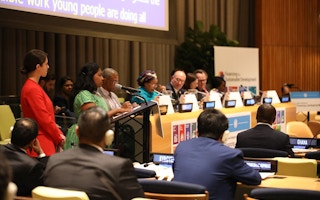There she was, Greta Thunberg, speaking truth to power. Not too impressed by the UN Secretary-General sitting next to her, or all the world leaders sitting right in front of her in the great hall of the UN General Assembly, but really angry. How dare you ask me what to do, a child that should be in school. Act now or we, the children, will not forget that you failed and betrayed us!
Hers were the most powerful words I heard at the UN Climate Summit 2019. Not words of courteous diplomacy that are the common currency in such meetings, despite what the speakers might really think, but raw emotion.
Fear for the future of our world. Greta Thunberg has managed to mobilise her own generation to stand up and demand “Climate Action Now” and shaming adults, parents and world leaders.
Will it work? Will it prod leaders to take real action against climate change?
Though nothing new was said by world leaders of the major economies, the large countries in the world, I saw many hopeful signs in meetings all over Manhattan. At the UN, some 70 countries now committed to the new norm—a net-zero carbon target by 2050.
Also, at the UN some 87 major private companies committed to align their actions to the 1.5-degree scenario, which also requires full Decarbonisation by 2050. And all across New York City during the Climate Week in events organised by NGOs, philanthropies, private companies, new commitments were made, new alliances and coalitions were formed, and examples were given that action can be taken.
I was most impressed by Denmark’s leadership. In many events, Prime Minister Mette Frederiksen demonstrated the leadership Greta Thunberg was calling for. Denmark has committed to achieve net-zero emissions by 2050, but the new government followed that by setting its 2030 target to reduce emissions by 70 per cent, marking the most ambitious national target in the world.
So, is this realistic and can it be done in Denmark? The Danish target should be perceived as President Kennedy’s call to go to the Moon. The key is to set a clear goal and then chart the actions needed to achieve that. Relying on demonstrating our ingenuity and innovation seems impossible today but can become possible tomorrow. I couldn’t agree more!
“
At the UN, some 70 countries now committed to the new norm—a net-zero carbon target by 2050.
In an effort to help reduce the country’s carbon dioxide emissions by 70 per cent, Danish pension funds have pledged to invest US$51.7 billion in green assets by 2030. Torben Möger Pedersen, CEO of PensionDanmark, said that the green deal will make Denmark an “absolute world leader” in its transition to a green economy.
Danish business leaders were ready to back up their government convinced that taking such strong climate action now is not only necessary to save the planet—but it is a must for businesses to get ahead of the curve on climate change to survive.
That is green growth in action! It is crucial to demonstrate that it is possible to take action now, decarbonise the economy and maintain a high standard of living in an inclusive economy that leaves no one behind. The key solutions are as follows:
- renewable energy that is commercially attractive to invest in;
- electric cars, buses and two-wheelers to end the combustion engine;
- energy efficiency gains in buildings, district heating and cooling, as well as appliances;
- circular economy approaches to deal with waste streams; and
- nature based solutions to protect and rehabilitate landscapes as well as sequester carbon.
Decarbonisation will have to go hand in hand with increasing resilience of our society to adapt to the changes in climate that are already with us and unavoidable. In New York the Global Commission on Adaptation, chaired by Mr. Ban Ki-moon, 8th Secretary-General of the UN and GGGI’s President & Chair presented its report and plan for action.
While the costs of adaptation are estimated to top US$7 trillion, the report also outlines solutions. Working with nature, rather than against it will provide answers here too. Nature-based solutions such as rehabilitation of degraded mangrove systems can sequester carbon while providing protection against storm surges or tsunamis, livelihoods for local people and maintain biodiversity.
Our food systems do need systemic change, not only to become climate resilient, but also to provide nutritious food for healthy populations to counter the surge in non-communicable diseases from diabetes to heart disease. In New York, a group of investors led by Bill Gates committed an additional US$790 million for climate smart agriculture.
It was encouraging to hear an increasing number of countries commit to doubling their contribution to the Green Climate Fund, from Germany, Norway, and the UK to Sweden. The need to invest in climate action is in the trillions of dollars and that can only come from the private sector, asset managers and institutional investors.
Seeing pension funds like Pension Danmark step up, and bring their colleagues to the table, is one of the first signs that this is now indeed happening.
Adding this up is not yet the decisive action Greta Thunberg was calling for. But it is a growing momentum that can—and should—lead to more ambitious Nationally Determined Contributions to the Paris Agreement that are due next year at the COP26 climate change conference in Glasgow. That is shaping up to be a milestone of major significance like the Paris COP in 2015.
The NDC Partnership is bringing together over 150 countries, and organisations including the Global Green Growth Institute (GGGI), to ensure that there is strong support to deliver solid and more ambitious NDCs next year. GGGI has made the 2020 NDCs a priority in its support of its Member countries.
Decisive climate action is a critical part of achieving the Sustainable Development Goals (SDGs) and both can only be achieved through strong partnerships between and among governments, businesses and civil society. True partnerships are not easy.
One excellent example is the still-young P4G—Partnering for Green Growth and the Global Goals 2030, an initiative taken by Denmark and launched through a first heads-of-state summit in October 2018 in Copenhagen.
In New York, President Moon Jae-In of announced that the Republic of Korea will host the second P4G summit in Seoul in June 2020. That should become another key milestone on the way to Glasgow, where countries can share their progress in the green transition and their commitment to climate action.
GGGI’s 33 Member countries, and over 20 additional countries on the road to membership, form a club of more than 50 countries committed to green growth as a development path that can deliver environmentally sustainable growth that is socially inclusive, as demonstrated so eloquently by Denmark’s leaders in New York. GGGI’s Members are set to deliver ambitious climate targets and achieve their SDGs as part of their green transition.
Summing up, while the leaders of major world economies have not yet delivered the climate action Greta Thunberg demands—earning President Trump her death stare—there were many positive signs pointing to accelerating action and admirable leadership in New York.
We have another 14 months left until the Glasgow climate change conference next year to live up to the expectations of Greta Thunberg and her generation. How dare we fail them!
Dr. Frank Rijsberman is director-general of the Global Green Growth Institute.









